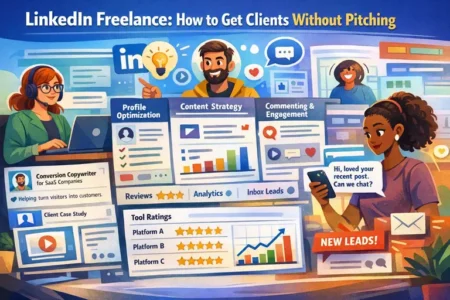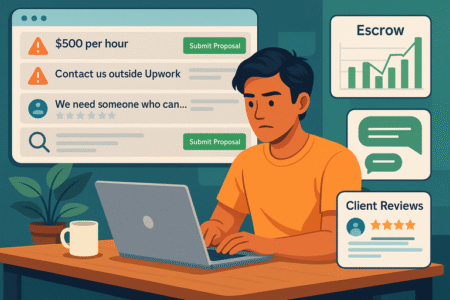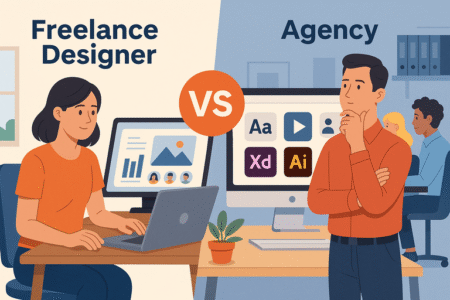Table of Contents
Hiring a freelance WordPress developer can feel like a gamble. You want someone who delivers quality work on time, but how do you avoid the risks of missed deadlines, poor communication, or unfinished projects?
This guide walks you through proven ways to hire the right developer safely and effectively.
Why Choosing The Right Freelance WordPress Developer Matters
Hiring the right freelance WordPress developer isn’t just about filling a skill gap. It’s about protecting your website, your brand, and ultimately your business growth.
Let me walk you through why this decision carries so much weight.
Assessing the Impact on Website Performance
A website isn’t just a digital brochure anymore—it’s the heartbeat of your business. A developer who knows WordPress inside and out can optimize site speed, configure caching plugins properly, and ensure mobile responsiveness.
For example, even shaving off two seconds from load time can reduce bounce rates dramatically. I’ve seen projects where a skilled developer cut page load times in half by fine-tuning scripts and leveraging a CDN (content delivery network).
That’s not just tech wizardry; it’s money saved and conversions gained.
On the flip side, if performance is overlooked, you’ll lose visitors before they even see your content. Google also penalizes slow websites in search rankings, so the wrong hire can hurt your SEO without you realizing it.
How the Wrong Hire Can Cost Time and Money
It’s tempting to hire the cheapest developer you find, but that decision can backfire. I’ve worked with clients who spent weeks fixing bugs left behind by bargain hires. Imagine paying twice—once for sloppy work, then again to repair it.
A poor developer might:
- Leave security loopholes that expose your site to hacks.
- Deliver a site that looks good but breaks under real traffic.
- Disappear midway through the project, leaving you stranded.
Every delay or broken feature translates into lost traffic, frustrated customers, and missed revenue opportunities.
Why Skills and Reliability Should Outweigh Low Rates
It’s natural to want to save money, but when it comes to developers, cheap rarely means good. Reliability is just as important as technical know-how.
A dependable freelance WordPress developer communicates openly, sticks to deadlines, and takes ownership when problems arise.
I suggest prioritizing someone with a proven track record, even if their hourly rate is higher.
In practice, a $60/hour developer who finishes quickly and correctly costs less than a $20/hour developer who drags the project on for months.
Where to Find Trusted Freelance WordPress Developers
Knowing where to look is half the battle. There are a lot of platforms out there, but not all are created equal. Here are three of the best ways to find reliable talent.
Using Reputable Platforms Like Upwork and Toptal
Upwork is one of the largest freelance marketplaces, and it offers transparency through client reviews and verified work history. You can post your project, filter by WordPress skills, and even invite candidates who match your requirements.
The key is to dig into their “Job Success Score” and past client feedback before reaching out.
Toptal takes it one step further with a vetting process that accepts only the top 3% of freelancers. It’s pricier, but if you want peace of mind and access to elite talent, it’s worth considering.
I recommend Toptal if your project involves complex custom development or mission-critical functionality.
Exploring Specialized WordPress Job Boards
Sometimes niche beats general. Sites like Codeable, focus exclusively on WordPress professionals. The advantage is that everyone on these platforms already knows the ecosystem, from plugin conflicts to WooCommerce quirks.
For instance, Codeable specializes in pre-vetted WordPress developers and consultants. Their system pairs you with experts who match your project, and you only pay when you’re satisfied. This reduces the risk of wasting time on unqualified candidates.
Leveraging Professional Networks and Referrals
Never underestimate the power of a good recommendation. Ask peers in your industry, check LinkedIn connections, or even post in WordPress Facebook groups. Many business owners I know found their best developers through simple referrals.
A referral comes with built-in trust—someone has already vetted the developer for you. Plus, it opens the door to longer-term relationships because you’re working with someone who values their reputation.
Defining Clear Project Requirements Before Hiring
Even the most talented developer can’t deliver results if you don’t explain what you need. Clarity is your best tool for reducing risks.
Writing a Detailed Scope of Work
Think of your scope of work as the blueprint. Outline exactly what you expect: Design elements, functionality, integrations, and performance benchmarks.
For example:
- “Install and configure WooCommerce for 50 products.”
- “Set up email automation with Mailerlite integration.”
- “Ensure site passes Google’s PageSpeed Insights with a score above 90.”
The more specific you are, the fewer surprises you’ll face down the line. I recommend writing your scope in plain language first, then breaking it into technical tasks the developer can check off.
Setting Realistic Deadlines and Deliverables
Deadlines keep projects moving, but they must be realistic. Rushed deadlines lead to sloppy work, while vague ones cause endless delays.
Here’s a simple approach:
- Break the project into milestones (design, development, testing, launch).
- Assign dates to each milestone.
- Define what “done” looks like for each stage.
For instance, “Homepage draft ready for review by Day 10” is clear, measurable, and leaves no room for confusion.
Clarifying Budget Expectations Upfront
Money conversations can feel awkward, but they prevent misunderstandings later. Share your budget range before starting, and be upfront about whether you’re open to hourly rates, fixed pricing, or a mix of both.
I believe it’s best to agree on milestone-based payments. This way, you only release funds when work is completed to your satisfaction.
Platforms like Upwork even offer escrow services that hold your money securely until you approve the deliverables.
Screening Freelance WordPress Developer Portfolios Effectively
A portfolio is often the first window into a developer’s abilities, but you have to know what to look for beyond the pretty screenshots.
A thoughtful review can save you from hiring someone who looks good on paper but struggles in practice.
Looking Beyond Aesthetics to Technical Skills
A polished design doesn’t always mean the code behind it is solid. When reviewing a portfolio, don’t just admire the visuals—dig deeper.
Ask for links to live websites, then run them through free tools like Google PageSpeed Insights. This gives you insight into site performance, load times, and responsiveness.
I’ve seen sites that looked stunning but scored below 40 on performance tests because of bloated code or unoptimized images. That’s a red flag. A skilled freelance WordPress developer should balance beauty with functionality.
You can also ask whether they built custom themes or worked from templates. Building from scratch demonstrates stronger problem-solving skills than just tweaking an off-the-shelf theme.
Checking Diversity of Past Projects
A versatile developer should show variety in their work. Look for projects that cover different industries, features, and functionalities.
For instance, one project might be a blog with strong SEO foundations, while another could be a WooCommerce shop with custom checkout flows.
If their portfolio is too narrow—say, only blogs or only small brochure sites—you might question whether they can handle more complex requirements.
I usually recommend picking someone who has tackled projects that align with your level of ambition, whether that’s e-commerce, membership sites, or high-traffic platforms.
Identifying Work Aligned With Your Business Needs
Here’s where you get practical. If you’re planning a membership site, look for past work where they implemented membership plugins like MemberPress or Restrict Content Pro.
If you need e-commerce, check for WooCommerce projects with features like variable products or subscription billing.
Don’t hesitate to ask questions about specific portfolio pieces: “How did you optimize checkout speed?” or “What plugin conflicts did you solve here?” The way they answer reveals whether they truly owned the project or just played a minor role.
Evaluating Skills With Practical Tests and Trials
Portfolios show the past, but trials reveal how a developer will perform for you today. Testing skills in real time helps separate polished talkers from genuine problem-solvers.
Asking for a Small Paid Test Project
Instead of handing over your entire website, start with a low-risk, paid assignment. It could be something like:
- Fixing a plugin conflict.
- Customizing a WordPress theme function.
- Setting up a contact form with conditional logic.
Keep it simple but real. I’ve done this many times, and it quickly shows whether the developer follows instructions, respects deadlines, and produces clean work.
Offering payment also communicates respect—it tells the developer you value their time and effort.
Reviewing Problem-Solving and Coding Practices
When you review the test, don’t just look at the end result. Check how they got there. Did they use quick hacks or proper WordPress best practices?
For example, if they edited core files instead of using a child theme, that’s a serious issue—it means future updates could break your site.
You can also ask them to explain their solution in plain language. A strong developer can translate technical details into something non-technical people understand. That ability signals they’ll be easier to collaborate with long term.
Measuring Responsiveness and Collaboration
A trial project is also about how they communicate. Do they respond promptly to questions? Do they ask clarifying questions before starting? Do they deliver updates proactively?
I once worked with a developer who technically nailed the task but was impossible to reach for weeks at a time. In the end, communication breakdowns slowed everything. You’re not just hiring skills—you’re hiring a working relationship. Trials make that dynamic visible early.
Checking References and Client Feedback Thoroughly
References and reviews aren’t just formalities—they’re clues to how a freelance WordPress developer behaves under real project pressure.
How to Read Between the Lines of Testimonials
Testimonials often sound glowing, but the real insights lie between the lines. Look for mentions of reliability, communication, and problem-solving, not just “great work” or “nice website.”
A testimonial like “they handled unexpected plugin issues calmly and quickly” tells you far more than generic praise.
If all the reviews sound overly polished or vague, I get cautious. Real clients usually give specific feedback about deadlines, responsiveness, or technical fixes.
Asking Past Clients the Right Questions
When you speak with a reference, go beyond “Were you happy with their work?” Try targeted questions such as:
- “How did they handle unexpected challenges?”
- “Did they stay within budget and timeline?”
- “Would you hire them again, and why?”
I suggest keeping the tone conversational, almost like chatting with a peer. People open up more when it doesn’t feel like an interrogation.
Spotting Red Flags in Work History
Pay attention to gaps or inconsistencies. If they’ve had short stints with many clients, it could mean unfinished projects or conflicts. Frequent negative mentions of “missed deadlines” or “lack of communication” are major red flags.
Another warning sign is overpromising. If someone claims they can “build a full e-commerce platform in two days,” run the other way. The right freelance WordPress developer knows how to set realistic expectations and respects professional boundaries.
Using Contracts and Legal Agreements to Reduce Risks
A solid contract is your safety net. It’s not about distrust—it’s about protecting both you and the freelance WordPress developer so expectations are crystal clear.
Outlining Scope, Timelines, and Revisions Clearly
Think of your contract as the project’s instruction manual. Write out the scope in detail: the features to be built, plugins to be installed, and the level of customization required.
Don’t forget revisions. For example, you might allow two rounds of design changes but make it clear that extra revisions cost more.
Timelines should be realistic and broken into milestones. Instead of “Website done in 6 weeks,” write:
- Week 2: Homepage design draft.
- Week 4: All internal pages built.
- Week 6: Final testing and launch.
This prevents “scope creep,” where projects balloon out of control.
Protecting Intellectual Property and Confidential Data
Your website is an asset, and the code, graphics, and content belong to you once paid for. Spell that out in writing. I always advise including a clause that clearly states ownership rights transfer upon full payment.
Also, if your project involves sensitive information—like customer data or API keys—have the developer sign a non-disclosure agreement (NDA). It’s a simple step that prevents headaches later.
Including Payment Milestones for Accountability
Milestones aren’t just good for project flow—they keep everyone accountable. Break payments into chunks tied to deliverables, like 25% upfront, 25% at design approval, 25% after development, and 25% on final delivery.
This structure motivates the developer to stay on track while giving you leverage if work stalls. Platforms like Upwork make this easy with built-in milestone payments.
Ensuring Smooth Communication Throughout the Project
Even the most talented developer can derail a project if communication breaks down. Setting clear rules for how and when you’ll talk saves frustration.
Setting Preferred Communication Channels Early
Don’t leave this vague. Decide whether you’ll use email, Slack, Trello, or a project management tool like Asana. Personally, I like using Slack for quick updates and Trello for task tracking—it keeps everything transparent.
From the start, make it clear where conversations happen so nothing gets lost in random emails.
Agreeing on Frequency of Progress Updates
Silence can be scarier than bad news. Agree on a rhythm for updates, whether that’s daily check-ins or weekly progress reports.
For example, I’ve had developers send me a quick Friday email recap: “This week we finished X and Y; next week we’ll tackle Z.” It takes five minutes but builds trust and keeps me in the loop.
Handling Time Zone Differences Effectively
Working with someone halfway across the world isn’t a problem if you plan around it. Ask for overlapping hours where both of you are online—maybe two or three hours daily.
If that’s not possible, use tools like Loom to record video walkthroughs of tasks. It’s a lifesaver because they can watch your instructions while you’re asleep, and you wake up to updates.
Choosing Safe Payment Methods for Freelance Work
Money matters can sour a relationship quickly if you don’t handle them properly. Safe payment methods keep both you and the developer secure.
Why Escrow Services Protect Both Sides
Escrow is basically a neutral holding account. You deposit money, but the developer only gets paid once you approve the work. Platforms like Upwork and Fiverr make this seamless.
I believe escrow is the best way to build trust early—developers know you’ve funded the project, and you know you won’t lose money without results.
Structuring Milestone-Based Payments
Break your project into small, payable stages. For example:
- Deposit 20% upfront.
- Pay 30% when the main structure is complete.
- Release 50% when the site is tested and live.
This setup keeps the developer motivated while giving you control over quality.
Avoiding Risky Direct Transfers
It might be tempting to pay via direct bank transfer or PayPal friends-and-family to “save on fees,” but don’t.
Once money is sent, it’s almost impossible to recover if things go wrong. Stick with platforms or business payment methods that offer dispute resolution.
Building a Long-Term Relationship With a Reliable Developer
Hiring a freelance WordPress developer doesn’t have to be a one-off. If you find a good one, nurturing the relationship saves you endless stress in the future.
Rewarding Good Work With Repeat Projects
Developers value steady work. If someone does well, bring them back for updates, plugin installations, or even a retainer arrangement. I’ve had one developer on call for years, and it’s saved me hours of searching every time I needed help.
Offering Constructive Feedback for Improvement
Be honest, but be kind. Instead of saying, “This doesn’t work,” try, “I like this direction, but could we adjust X to better fit Y?”
Constructive feedback strengthens the relationship and helps the developer learn your preferences over time.
Creating Trust for Faster, Future Collaborations
Trust compounds. The more you work with someone, the less you have to explain.
A developer who knows your website and workflow can make changes in hours instead of days. That efficiency alone is worth nurturing loyalty.
Pro Tip to Hire Without Risks
Start with a trial project before diving into a big build. Something small—like customizing a plugin or setting up a landing page—lets you test skills, communication, and reliability in real time.
If they deliver, you’ve found someone worth keeping. If not, you’ve dodged a bullet with minimal loss.






